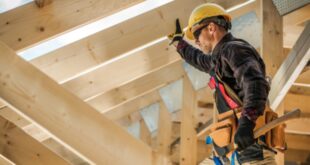By Phillip B. Burum
The American home is for most Americans the biggest and best investment they will make in their lifetimes and one of the best, most environmentally-sound and cost-effective ways to enhance that investment is with landscaping. Improving your landscaping can save money, conserve water and energy and enhance your home’s ‘curb appeal’ – whether in preparation for a home sale or just making your home’s appearance the best that it can be. With spring on the horizon and a wet winter behind us, there is no better time than now.
While we have experienced generous rainfall this winter, we have to remember that our region features a Mediterranean climate that is distinguished by mild winters and hot, dry summers. This is defined by regular periods of drought followed by periods of abundant rainfall. Because of this, conserving water is one of the most important things we can do to protect our quality of life.
Residential landscaping accounts for largest percentage of non-farming water uses in our state. Individual studies vary but the mean estimation is that landscaping accounts for 53 percent of our daily individual use of water.
Today’s new home communities feature modern landscaping features and equipment and on average use 50 percent less water than homes built in 1975 and 20 percent less than homes built a decade ago. However, thanks to technological innovation and exciting new approaches to landscaping, today offers many opportunities for owners of older homes to renovate their landscaping to conserve water, energy and time while beautifying their homes.
When considering landscaping improvements, your planning should begin by checking with your local water district. Water districts are the best resource when it comes to providing water-conserving landscaping guidance for their customers. Call your local water provider or visit www.bewaterwise.com, a website of the Metropolitan Water District of Southern California and the family of Southern California water agencies. They will show you the best methods of modernizing your landscaping with drought tolerant plants or other water-wise features.
While choosing drought-tolerant plants over conventional green lawns will definitely have a positive impact on your water costs, updating your sprinkler systems is just as important. Homeowners can reduce their water bills by hundreds of dollars annually by making the right choices on plant material and irrigation equipment.
Consult with a local nursery or home and garden center for suggestions on the best types of trees and shrubs that will thrive where you live. Because many communities encourage the planting of certain types of native species, local nurseries are generally very knowledgeable on the subject. Homeowners associations (HOAs) are usually another great resource and often provide landscape design guidelines including approved plants and trees. Also, check with your HOA if you belong to one to determine if changes to your landscape might require preapproval or architectural review.
The right landscaping choices can help you save on energy bills as well. Planting deciduous trees – which are trees that lose their leaves during the winter – in front of windows that receive significant amounts of sunlight will block solar heat in the summer while allowing sunlight in during the winter. Depending on the species, a six- to eight -foot deciduous tree will begin shading your windows the first year and your roof within five to 10 years.
Whether your intent is to replace your turf lawn with a more region-appropriate plant palette or you are prepared for a full-scale replacement of your irrigation system, modernizing your landscaping will reap untold rewards in the form of personal enjoyment as well as your monthly budget. As with any worthwhile project, determine your goals, develop a plan and stick to the budget. Maintaining discipline in the planning stages will save time and money when it’s time to put the first shovel in the ground.
Remember, two weeks ago Punxsutawney Phil, the legendary forecasting ground hog predicted an early spring, so even if you are not planning to sell your home, upgrading your home’s landscaping can beautify, insulate, and protect your home while saving money.
For further reading on home improvements that will beautify and enhance the value of your home, visit our website at www.BIABuild.com and have a great Spring.

Phillip B. Burum, Vice President-Land, D.R. Horton President, Building Industry Association (BIA) Baldy View Chapter
 IE Business Daily Business news for the Inland Empire.
IE Business Daily Business news for the Inland Empire.


